BOSNIA AND HERCEGOVINA
Go West 2005 A gay male couple in Sarajevo, Kenan, a Bosnian, and Milan, a Serb, plan to emigrate to the gay-friendly Netherlands, but the war strands them in Serb-controlled territory, and Kenan adopts female drag to avoid being found out as a circumcised Muslim. The pair escape to Milan's village, where the disguise is maintained through a traditional wedding. These two men barely kiss onscreen, though Kenan, who is bisexual, is shown having sex at least twice with Ranka, the village prostitute. Ranka eventually outs the gay men to Milan's father, while Milan is drafted into the Serbian army and killed. Though firmly anti-Serb and anti-war, the film reads as ultimately misogynistic. The sole woman among the leads is the cause of all conflict, while Milan's father and best friend accept his gay affair with equanimity. |
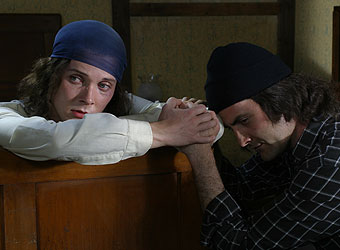 |
CROATIA
Fine mrtve djevojke (Fine Dead Girls) 2002 In Fine Dead Girls Iva and Marija move into an apartment building that is home to a rogues' gallery of characters: a war veteran suffering from post-traumatic stress, a prostitute paid to break up the couple by a priest who is one girl's father, a homophobic gorgon of an apartment manager, and her son, a slacker mama's boy who rapes one of the pair to prove his masculinity. The film takes aim at the brutality and amorality of contemporary Croatian society, targeting patriarchy, nationalism, and the Catholic Church, as well as homophobia. It obviously struck a chord, becoming the audience favorite at the Pula festival in '02 as well as Croatia's nominee for an Oscar the following year. |
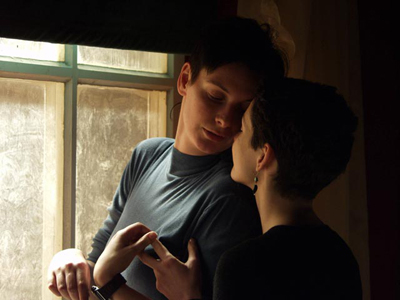 |
![]() CZECH REPUBLIC
CZECH REPUBLIC
WIKTOR GRODECKI'S CZECH HUSTLER DOCUMENTARIES:
My article on these: "Who's Renting These Boys?"
1. Not Angels, but Angels (1994) A documentary about boy prostitution in Prague. The economic boom and the recently won political freedom have turned that beautiful, graceful city into a new mecca for both Eastern and Western tourists in search of sex. Young men trying to live up to the standards of Western consumerism readily fall prey to quick, easy money from hustling. The young hustlers' disarming frankness and need to talk become the compelling engine that drives the film. They withhold nothing. Rather they speak of their lives in often gruesome and stripped-bare details, leaving us chilled by their short and fragile lives in grasp of the oldest trade on earth. (from the official blurb). |
|
2. Body without Soul (1996) |
3. Mandragora (1997) Prague beckons boys from their poverty to the promise of a better life. With each arriving train another innocent steps off into a maelstrom and the new "rabbit" is quickly lured into the world of drugs and prostitution. In this beautiful but brutal city, there is no shortage of buzards circling, watching and waiting for the wounded. Once again director Wicktor Grodecki has created an unflinching and all too real look at the sex trade that grabs your heart and leads you through the horrific life these boys are forced to endure. (From the distributor's site) |
|
Septej (Whisper), by David Ondricek (1996) Called a Czech "Kids," this film tracks Generation X in Prague and includes a kid who works as a rent boy. |
|
Zapovezena Laska (Forbidden Love) CZ 1990
Dir: Kvasnicka, Vladislav
A documentary look at homosexuality in Czechoslovakia, a country just beginning to understand that an estimated 750,000 of its citizens are gay and lesbian. Through incredibly honest interviews with gays, gay rights leaders--and blatant homophobes--director Vladislav Kvasnicka has created a film that captures the innocence of an incipient social movement as well as a chilling look at the culture they're up against.
GDR
| I Am My Own Woman [Ich bin meine eigene Frau] Rosa von Praunheim, Director 1992 : Germany : 90 minutes : Gay Transvestite : Biographical Drama : True life story of Charlotte von Mahlsdorf, the best known transvestite in East Germany; a symbol of bravery and idealism for today's German lesbians and gays. See the book as well! And now it's a Tony-winning Play, I Am My Own Wife. |
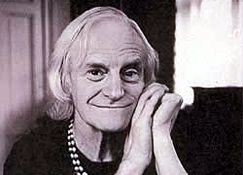 |
Westler: East of the Wall
Wieland Speck, Director
1986 : Germany : 94 minutes : Gay : Drama :
A West Berlin boy falls in love with an East Berlin boy on a day trip. The
border guards start getting suspicious when the West Berliner starts making
frequent trips, and the boys plan an escape for the East Berliner.
Coming Out |
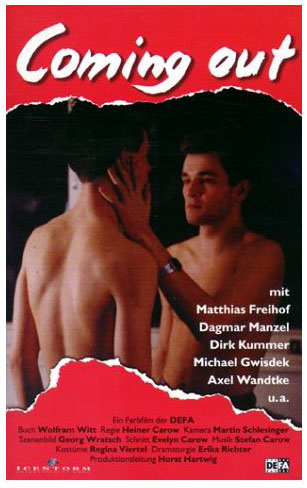 |
![]() HUNGARY
HUNGARY
ANOTHER WAY (Egymásra nézve) dir. Károly Makk, 1982 (available on video from Facets) Based on a novel by Erzsébet Galgoczi, the film shows an affair between two women journalists shortly after 1956 in Hungary. Perhaps the best known and best lesbian (or gay) film to come out of Eastern Europe. |
COLONEL REDL (Redl ezredes) dir. István Szabó Complex, fascinating account--inspired by John Osborne's A Patriot for Me as well as by actual historical evidence--of an ambitious, homosexual career soldier, whose ordinary family background does not hinder his rise to a position of high military rank in the Austro-Hungarian Empire prior to WW1. An incisive examination of the politics of power, highlighted by a superb Brandauer performance. Second in a trilogy, after MEPHISTO and followed by HANUSSEN. (Leonard Malten) |
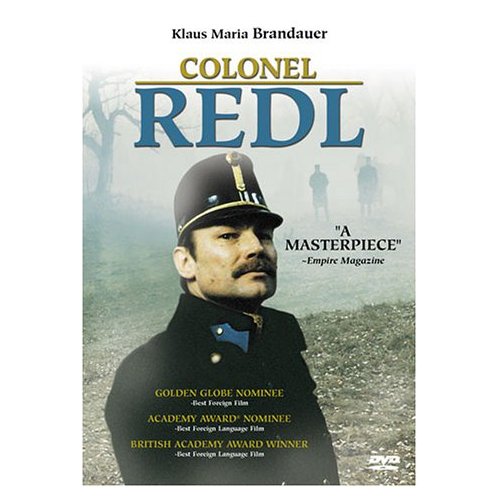 |
Nincsen nekem vágyam semmi HU 2000 Bruno, a bisexual but closeted young man lives in rural Hungary with his girlfriend Mari. Also on the scene is her homosexual brother Ringo. Mari doesn't know that when the boys go off to work together in the city they raise cash by turning tricks and burglarizing houses. |
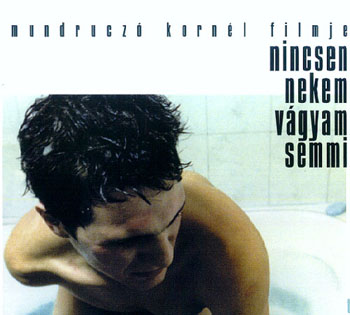 |
Csókkal és körömmel HU 1995
Dir:
Szomjas György
A Rozsaszin Göreny (The Pink Ferret) HU 2003
Dir:
Katrin Kremmler
![]() ROMANIA
ROMANIA
Legaturi Bolnavicioase (Love Sick) 2006) Based on Romanian author Cecilia Stefanescu's novel of the same name, this coming-of-age story marks a coming-of-age for Romanian cinema as well. Less concerned with politics than with emotional and moral ambiguities, Love Sick manages to tackle its controversial subject matter with delicacy and sweetness. |
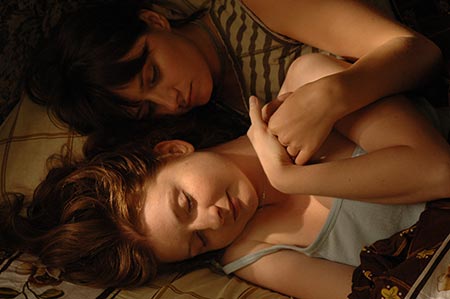 |
![]() SLOVAKIA
SLOVAKIA
Hana a jej bratia (Hanna and Her Brothers) SK 2000 In spite of being surrounded by a large family and many friends, eighteen year old Martin feels completely forlorn. In the tangle of crazy relationships he is looking for someone on his own wavelength, someone who, like himself, is different. Martin’s only refuge is the apartment of his eccentric neighbor, Theodora, an amateur photographer who helps Martin sift through the responses to his personal ads. Slowly Martin is drawn to Hanna and Her Brothers a local cabaret where Hanna is a man with a secret, the same one that Martin shares. “Hanna and Her Brothers” is one of the first films to come out of Eastern Europe to focus on gay characters. With it’s musical interludes and eclectic supporting cast it is a bright and hopeful film about finding one’s own path in life. “Hanna and Her Brothers” is one of the first films to come out of Eastern Europe to focus on gay characters. With it’s musical interludes and eclectic supporting cast it is a bright and hopeful film about finding one’s own path in life. |
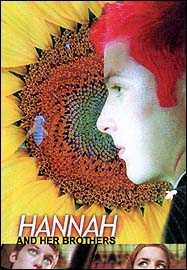 |
100% Cista laska II. SK 1996
Dir:
Vladimir Adasek
100% Cista laska II. - vasen is a bizarre psycho-sexual murder mystery about film-making. is a highly amusing and enjoyable film and the fact that it was co-produced by STV says much about how liberalism in Slovak society is starting to gain ground in unusual places. However, it only handles the realities of homosexuality obliquely and most of the time is engaged in a fantasy world. This is much of the film's charm, of course, but it is a far cry from a hard-hitting portrayal of life in Slovakia in or out of the closet. When STV starts producing films like that, liberalism will have truly arrived in Central Europe.
Supper Man (2004)
Dir: Albert Vlk
The film takes place in present-day Bratislava and focuses on the teenager Roland, just going through his coming out. Supper Man shows the narrow-mindedness and rigidness of his parents who are not able to accept their son’s homosexuality. Roland is confused and lonely and when he finally finds somebody, he runs away. In the end, he is put into a sanatorium where, his parents hope, he can be “cured”. Of course this will not happen and Roland returns home. Being still gay.
![]() SLOVENIA
SLOVENIA
Varuh Meje (Guardian of the frontier) SLO 2002 Three girls' summer canoe trip down the river Kolpa becomes a journey into fear when they discover that the wooded riverbanks not only conceal the frontier between Slovenia and Croatia, but also the border between the permissible and the forbidden, and that it is the self-styled Guardian of the Frontier who draws the line. |
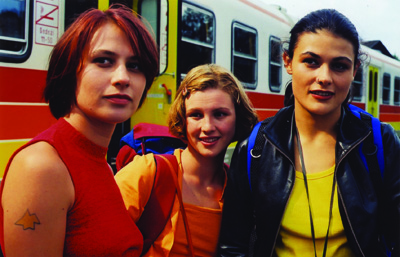 |
YUGOSLAVIA and
![]() SERBIA
SERBIA
MARBLE ASS (Dupe od mramora) Vjeran Miladinovic as Merlyn |
VIRGINA A Yugoslav film about a woman who is raised as a man. Directed by Srdjan Karanovic (1992).
Vincent Canby Review in the New York Times
My articles on the film: "From Sworn Virgins to Transvestite Prostitutes: Performing Gender and Sexuality in Two Films from Yugoslavia," in Aleksandar Stulhofer and Theo Sandfort, eds., Sexuality and Gender in Postcommunist Eastern Europe and Russia. NY: Haworth Pr., 2005, 79-94.
"Jugoslovenski transdžender heroji: Virgina i Marble Ass." Reć, Br. 67.13 (Sept., 2002), 327-347.
| Diši duboko (Take a Deep Breath) 2004 Dir. Dragan Marinković Take a Deep Breath portrays a younger generation that blames parents for the dire situation of contemporary Serbia. Here we have a middle-aged conservative judge who attempts to retain patriarchal control over his family. His wife has a secret affair with a younger man, while his daughter Sasha plans to leave the country with her boyfriend. When the boyfriend is hospitalized after a car accident, Sasha switches her affections to his sister, who has come from Paris to help out. This film, too, presents a soft-focus playful eroticism in the affair between the two women, but the father eventually has his way and uses his power to disrupt the girls' idyll. Disturbingly, the film not only ends with vignettes of three happy straight couples, leaving the fate of the lesbian affair open to speculation, but it also hints at the evil father's latent homosexuality, presumably caused by a childhood molestation in an orphanage. The film thus argues for tolerance of lesbian love, but reinstates homophobia in the form of pedophilia as a root cause of the father's psychological trauma that drives the plot. |
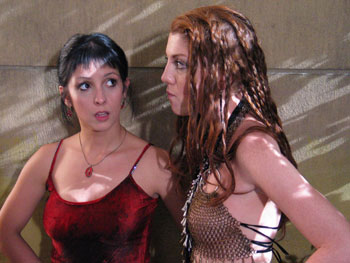 |